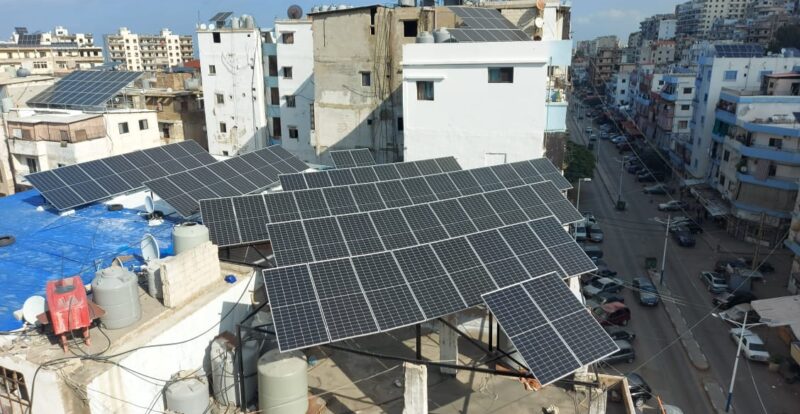
Transforming Communities: UTOPIA’s Solar Solutions for Sustainable Water Access
Pilot Project: Youth Resolve’s Solar-Powered Water Solutions in Tripoli:
As part of the Youth Resolve 2 project, the Tripoli Youth Committee identified water access as a major challenge in Tabbaneh through a comprehensive needs assessment. With electricity available for only 1–2 hours daily, powering water pumps consistently was nearly impossible. Even when electricity was available, the water network often wasn’t, leaving many households without water.
The lack of water created tensions among neighbors and between refugees and host communities, while poor hygiene conditions led to serious health concerns. Investigations revealed that only a few households used alternative energy for water pumps, some paid high costs for water, and the majority were left waiting for the network to function.
In response, the committee implemented a pilot project to connect water pumps in three Tabbaneh neighborhoods to solar-powered systems. This Quick Impact Project directly benefited 1,175 households (12,435 individuals), providing stable water access and easing community tensions.
Mona, a resident, shared: “Before this project, every day felt like a battle to get enough water for my family. The stress of not knowing if we’d have water tomorrow was overwhelming. Now, with consistent water access, life has become so much easier. I finally feel peace of mind, and my family’s health and daily routine have improved.”
This successful pilot was a foundation for scaling sustainable water solutions to other vulnerable areas in Tripoli and its surroundings.
Youth RESOLVE 2 is the continuation of a project funded by the European Union, and carried out by World Vision, UTOPIA, DPNA and GAME. The goal of the consortium is to empower youth by providing them with the tools to become leading actors in their communities.
7 Green WASH Projects: Driving Sustainable Water Solutions Across Tripoli:
UTOPIA, building on its successful pilot projects, has expanded its efforts in partnership with Oxfam and with the financial support of DANIDA (Danish International Development Agency). Together, we have implemented 7 green projects across Tripoli and its surrounding areas to ensure sustainable and reliable access to water through solar energy solutions. These initiatives aim to address challenges such as water shortages, unreliable electricity, and high operational costs by integrating solar power into water supply systems.
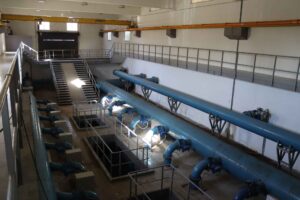
Operation Warehouse of the Water Establishment Department in North Lebanon Solar PV System:
This system addresses the challenges faced by the Water Establishment Department’s operation warehouse, which previously relied on an unreliable diesel generator operating for only a few hours daily. By installing solar power, we ensure uninterrupted electricity for administrative offices, the central warehouse, and the fuel station for water pumps, benefiting over 850,000 people in Tripoli and Akkar by improving the water supply and reducing operational costs.
Ayrounieh Water Pump Solar PV System:
In Ayrounieh, a water pump of the North Water Establishment Department, serving 2,400 households, has faced operational challenges due to insufficient power. By installing a solar PV system, UTOPIA aims to provide a sustainable and reliable energy solution, ensuring a consistent water supply for the community, reducing operational costs, and alleviating strain on the North Water Establishment Department.
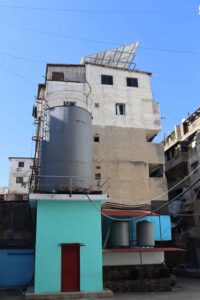
Tall Olya Water Pump Solar PV System:This system addresses significant water supply challenges, including frequent electricity cuts, pump malfunctions, and generator problems. By providing a reliable and sustainable solar-powered pump, it ensures continuous water access for approximately 500 residents, reducing dependency on costly diesel fuel and improving overall water availability.
Tebbane Borehole Solar PV System:
Tebbane residents faced chronic water shortages due to high electricity costs and limited generator operation. UTOPIA’s solar installation ensures a consistent water supply for 3,000 residents by reducing reliance on expensive fuel and enhancing community resilience to energy and water crises.
Qobbeh Water Pump Solar PV System Enhancement:
The previous solar system for Qobbeh was underperforming due to damaged panels and inconsistent power supply. With new solar panels and additional installations, UTOPIA ensures a reliable water supply for 2,000 households, minimizing reliance on diesel generators and ensuring a more sustainable energy solution.
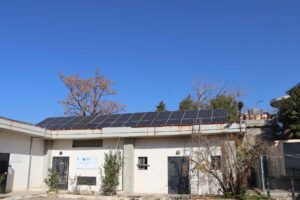
Wadi Jalloul Water Pump Solar PV System:
Wadi Jalloul residents faced ongoing water shortages caused by frequent electricity cuts and the high cost of operating a private generator. The newly installed solar system provides a consistent power source for the water pump, ensuring continuous water availability for approximately 720 residents.
Beddawi Borehole Solar PV System:
In Beddawi, residents of the Faytrouni compound faced challenges with limited water access due to the reliance on a diesel generator. By implementing a solar-powered system, UTOPIA offers a cost-effective and sustainable energy solution, reducing fuel costs and enhancing resilience for continuous water supply for 120 residents.
Sustainable Water Access and Community Empowerment in Bab al Tabbaneh and Wadi Nahle:
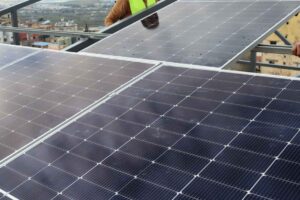 The ongoing project, titled “Sustainable Water Access and Community Empowerment in Bab al Tabbaneh and Wadi Nahle,” builds upon UTOPIA’s proven expertise in implementing solar-powered solutions under the Shabake 2 project, funded by Expertise France through AFD. This initiative leverages UTOPIA’s prior achievements in renewable energy to tackle critical water and sanitation challenges in two vulnerable neighborhoods in Tripoli, North Lebanon. Specifically, the project targets the installation of solar power systems to ensure consistent electricity supply for operating 13 water boreholes across these areas. These interventions aim to provide sustainable water access, benefiting approximately 954 households, while promoting environmental sustainability and social cohesion in neighborhoods with complex demographic and socio-economic challenges.
The ongoing project, titled “Sustainable Water Access and Community Empowerment in Bab al Tabbaneh and Wadi Nahle,” builds upon UTOPIA’s proven expertise in implementing solar-powered solutions under the Shabake 2 project, funded by Expertise France through AFD. This initiative leverages UTOPIA’s prior achievements in renewable energy to tackle critical water and sanitation challenges in two vulnerable neighborhoods in Tripoli, North Lebanon. Specifically, the project targets the installation of solar power systems to ensure consistent electricity supply for operating 13 water boreholes across these areas. These interventions aim to provide sustainable water access, benefiting approximately 954 households, while promoting environmental sustainability and social cohesion in neighborhoods with complex demographic and socio-economic challenges.
